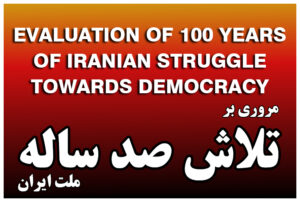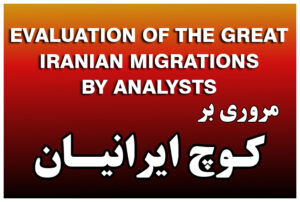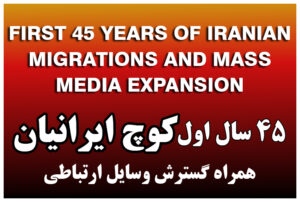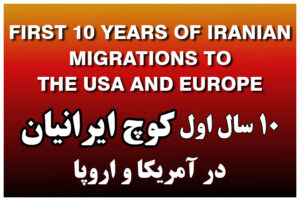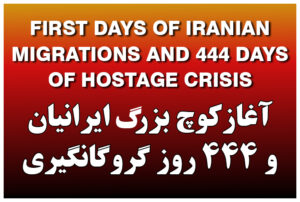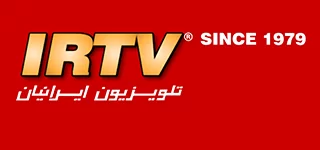The shah and his family flew into exile.

www.KOOCH79.org
NONPROFIT ORGANIZATION
CULTURAL
EDUCATIONAL
HISTORICAL
POLITICAL
Kooch 79, curated by Ali Limonadi, offers a captivating exploration of Iran’s rich history, focusing on key aspects such as Iranians’ migration and the Iranian Revolution. This unique collection of untold stories and rare footage provides a profound opportunity to delve into the heart of these historical events and connect with the past in a way that goes beyond traditional narrative.
فرهنگی
آموزشی
تاریخی
سیاسی
انقلاب 1979 بزرگترین مهاجرت ایرانیان را رقم زده است، کوچ 79 ساخته علی لیمونادی، مجموعه ای بی همتا از داستان های ناگفته و فیلم های کمیابی است که به شما فرصت میدهد، تا همراه با این کوچندگان در یک سفر شگفتانگیز، همانند یک تاریخ پژوه به بازشناسی ریشه های فرهنگی و سیاسی این مهاجرت ناخواسته با راویان آن رابطه برقرار نمایید و در ژرفای قلب این مهاجرت بزرگ تاریخی به موشکافی پبردازید.
OUR MISSION:
IS TO SHED LIGHT ON AND EDUCATE ABOUT THE UNDERLYING CAUSES FUELING THE REMARKABLE IRANIAN MIGRATION PHENOMENON.
1979
OCT. 22
The Carter administration allowed the former shah into the United States for medical treatment. Iran demanded the shah’s return. On November 4, students seized the U.S. Embassy and 52 diplomats in Tehran. The hostage crisis dragged on for 444 days. On November 5, interim Prime Minister Bazargan resigned, along with his cabinet, to protest the embassy seizure. On November 12, Washington cut off oil imports from Iran. On November 14, President Carter issued Executive Order 12170 freezing an estimated $6 billion of Iranian assets and official bank deposits in the United States.
کارگردان و تهیه کننده: علی لیمونادی کوچ 79 به ایران شناسی و آرشیو اختصاص دارد که شامل مجموعه ای ارزشمند از ویدئوهای 44 سال اخیر دیده نشده است. این سایت با هدف آموزش نسل آینده در مورد چگونگی تأثیر انقلاب اسلامی ایران بر مهاجران ایرانی در سراسر جهان است. آرشیو موجود در این سایت گنجینه ای از فیلم های تاریخی است که نگاهی اجمالی به فضای اجتماعی، فرهنگی و سیاسی ایران در دوران انقلاب و پس از آن دارد. از تظاهرات گرفته تا جشنها، سخنرانیها تا زندگی روزمره، این ویدیوها چشماندازی بینظیر از لحظهای مهم در تاریخ ایران ارائه میدهند. اما ماموریت این سایت فراتر از صرفاً حفظ فیلم های تاریخی است. با در دسترس قرار دادن این ویدیوها برای مخاطبان گستردهتر، سازندگان امیدوارند جرقهای برای گفتوگوها و ارتقای درک تجربیات مهاجران ایرانی و خانوادههایشان داشته باشند. چه دانشجوی تاریخ ایران باشید و چه صرفاً در مورد تأثیر انقلاب اسلامی کنجکاو باشید، این سایت نگاهی اجمالی به دوره ای پیچیده و اغلب سوء تفاهم شده ارائه می دهد. هدف آن از طریق آرشیو و منابع آموزشی، پر کردن شکاف بین نسلها و ترویج قدردانی عمیقتر از میراث غنی فرهنگی ایران است. ہ
Director and Producer: Ali Limonadi
kooch 79 is dedicated to Iranian study and archive, which contains a valuable collection of never-before-seen videos from the past 44 years. This site aims to educate the next generation on how the Islamic revolution of Iran impacted Iranian immigrants all around the world.
The archive on this site is a treasure trove of historical footage that provides a glimpse into the social, cultural, and political climate of Iran during and after the revolution. From protests to celebrations, speeches to everyday life, these videos offer a unique perspective on a pivotal moment in Iran’s history.
But the site’s mission goes beyond simply preserving historical footage. By making these videos accessible to a wider audience, the creators hope to spark conversations and promote understanding of the experiences of Iranian immigrants and their families.
Whether you’re a student of Iranian history or simply curious about the impact of the Islamic revolution, this site offers a fascinating glimpse into a complex and often misunderstood period. Through its archive and educational resources, it aims to bridge the gap between generations and promote a deeper appreciation of Iran’s rich cultural heritage.
1979 JAN. 16
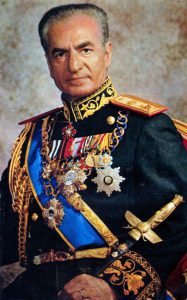
1979 FEB. 1
Ayatollah Ruhollah Khomeini returned to Iran after 14 years in exile in France and Iraq. On February 11, Khomeini appointed Mehdi Bazargan to be interim prime minister of a new revolutionary government.
1979 FEB. 14
After a brief firefight, the U.S. Embassy was seized by leftist students and one Marine guard was taken hostage. Foreign Minister Ebrahim Yazdi intervened and the embassy was returned to Ambassador William Sullivan in a few hours. The Marine was held for six days by his captors. On August 10, Iran canceled a $9 billion arms deal with the United States made during the shah’s reign.
1979 MARCH 30-31
In a referendum, voters overwhelmingly approved the creation of an Islamic Republic. Khomeini declared April 1 the first day of “the government of God.” On May 5, the Revolutionary Guards were established by a Khomeini decree. On June 14, the Bazargan government published a first draft of a new constitution. It did not include the position of velayat-e faqih (guardianship of the jurist or supreme leader). On October 24, a new constitution with a velayat-e faqih as the ultimate power was approved in a public referendum following months of debate over the role of Islam in the state. The new constitution went into effect in early December, and Khomeini officially became supreme leader.
1979 OCT. 22
The Carter administration allowed the former shah into the United States for medical treatment. Iran demanded the shah’s return. On November 4, students seized the U.S. Embassy and 52 diplomats in Tehran. The hostage crisis dragged on for 444 days. On November 5, interim Prime Minister Bazargan resigned, along with his cabinet, to protest the embassy seizure. On November 12, Washington cut off oil imports from Iran. On November 14, President Carter issued Executive Order 12170 freezing an estimated $6 billion of Iranian assets and official bank deposits in the United States.
1980 JAN. 25
Abolhassan Bani-Sadr was elected Iran’s first president. On February 19, Khomeini appointed Bani-Sadr commander-in-chief of the military too. Between March and May, Iran elected its first revolutionary parliament. Akbar Hashemi Rafsanjani, a cleric and former political prisoner under the shah, was elected speaker.

